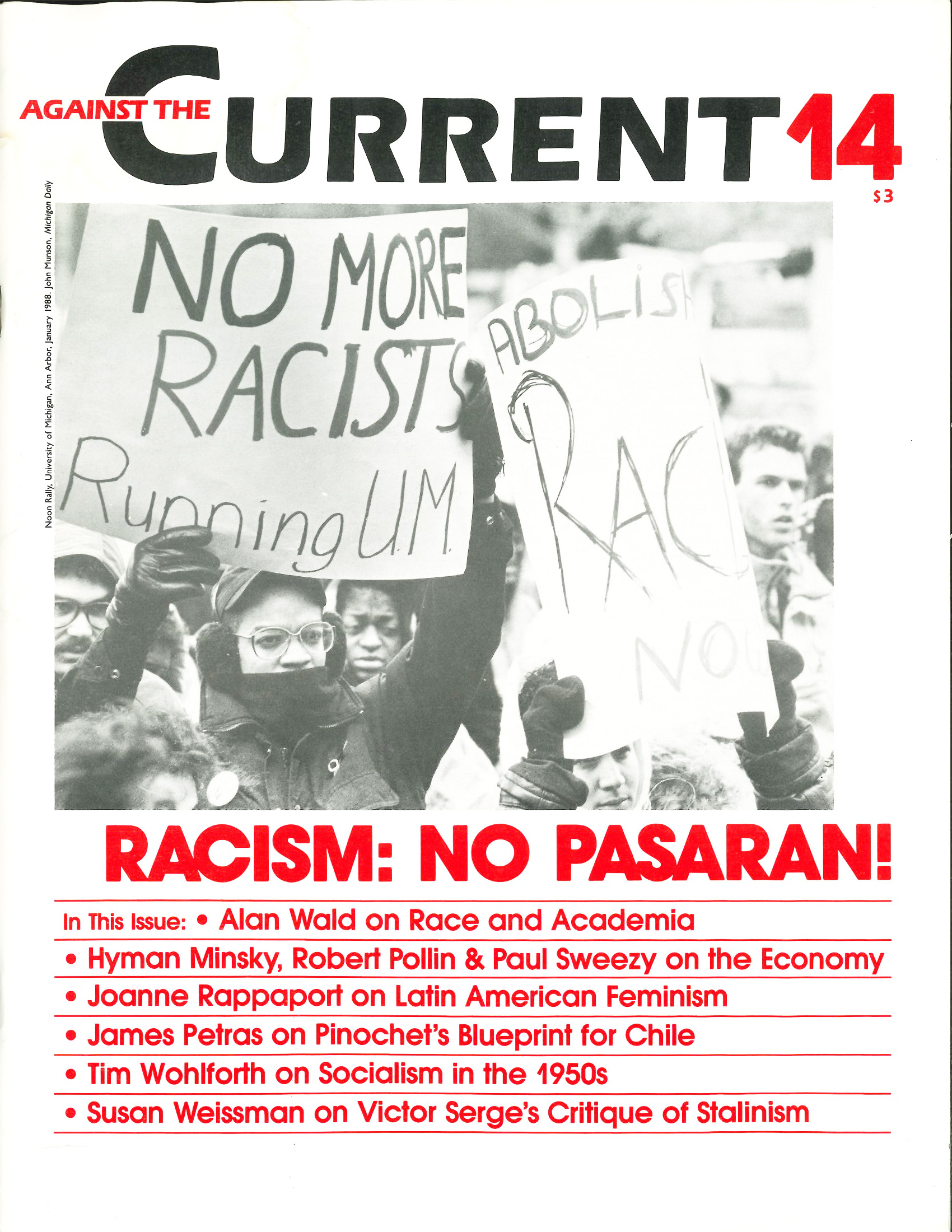Against the Current, No. 14, May/June 1988
-
From Locked Out to Locked In?
— The Editors -
Our Heroes, As We See Them
— Sol Saporta -
Eyewitness to the Palestinian Uprising
— an interview with Marty Rosenbluth -
Latin American Women: "We're All Feminists"
— Joanne Rappaport -
Chile in 2000: The Generals' Blueprint
— James Petras -
Revolutionaries in the 1950s
— Tim Wohlforth -
Victor Serge's Critique of Stalinism, Part II
— Suzi Weissman -
Random Shots: The Bones Break, the Clubs Hold
— R.F. Kampfer - Resisting the New Racism
-
Racism and the University
— Alan Wald -
South Africa's Media Scam
— Dianne Feeley - The Economy & the Crash
-
After the Crash: A New Stage?
— Frank Thompson -
Accumulation Leads to Crisis
— Paul Sweezy -
Who's Been on a Binge?
— Robert Pollin -
In a World of Uncertainty
— Hyman P. Minsky - Review
-
What Makes Things Change?
— Tony Smith - Dialogue
-
Against Radical Mythology
— Peter Drucker -
The Power of Radical Religion
— Ken Todd - Letters to the Editors
-
Clarify Palestinian Self-Determination
— Charlie Post -
Market Socialism through Socialist Feminist Analysis
— Ilene Winkler
Charlie Post
YOUR “LETTER From the Editors: Occupation in Permanent Crisis” in ATC 12-13 presented both a convincing analysis of the origins and significance of the current uprising in Gaza and the West Bank and a clear set of tasks for socialists and Palestine solidarity activists in the United States. However, your failure to specify the content of 0an independent Palestinian state… self-determination” (8) could lead to a political practice very different from the one you advocate.
The relationship of an independent Palestinian state to the current Zionist state is never made dear. Will the new state be a democratic and secular Palestine that embraces the current populations and territories of Israel and the occupied territories?
Or will the new state be an exclusively Palestinian Arab state on the West Bank and Gaza that co-exists with an exclusively Jewish state in the pre-1967 borders of Israel? The quote from the Palestinian activist in Detroit)–“We do not want to destroy a state; we want to build one”–implies that the editors of ATC embrace the second meaning of self-determination.
Advocating a “two-state” or “mini-state” version of Palestinian self-determination presents problems for both the Palestinian people and U.S. anti-Zionist activists. First, calling for a Palestinian state in the occupied territories shifts the focus of struggle and solidarity from the burgeoning self-activity and self-organization of the Palestinian masses and the Israeli peace movement to the diplomatic maneuvering of U.S. imperialism, the Soviet bureaucracy, the Zionists and the bourgeois Arab regimes.
Only a mass, popular uprising can create a democratic and secular Palestine. By contrast, only secret negotiations among ruling classes and elites-negotiations that have always short-changed the masses–can create a Palestinian “mini-state.”
Second, supporting a “two-state” solution runs counter to the call for the complete and unconditional end of all U.S. aid to Israel. The creation of a “mini-state” requires some sort of II diplomatic settlement” in the Middle East This can only mean a continued and probably heightened role for U.S. imperialism.
It is very likely that the United States would have to increase aid (especially military aid) to Israel to convince the Zionists to accept the creation of a West Bank/Gaza Palestinian state.
Third, calling for a Palestinian “mini-state” that coexists with Israel is an implicit endorsement of the Zionists’ “head-long rush to apartheid.” (8) The “two-state” solution means the continued existence of a Zionist state in Israel-an exclusively Jewish state where all other peoples are relegated to, at best, second class citizenship.
The separation and subordination of the Palestinian masses to the Zionist ruling class will not end with the creation of a Palestinian state on the West Bank and Gaza. The Palestinian “mini-state’s” relations to the Zionist state will be much the same as the relation of the ostensibly independent “bantustans” to the South African apartheid state. A Palestinian “mini-state” will be a politically and militarily subordinate source of cheap labor for the Zionist state.
Clearly, socialists and other advocates of a democratic and secular Palestine must work together with proponents of a “two-state” solution to oppose the Israeli occupation and U.S. aid. However, revolutionary socialists and other anti-Zionists should patiently explain the problems of the “two-state” strategy to other pro-Palestinians.
We cannot afford to be unclear about the content of our call for Palestinian self-determination. Unfortunately, its content was far from clear in your letter.
May-June 1988, ATC 14

